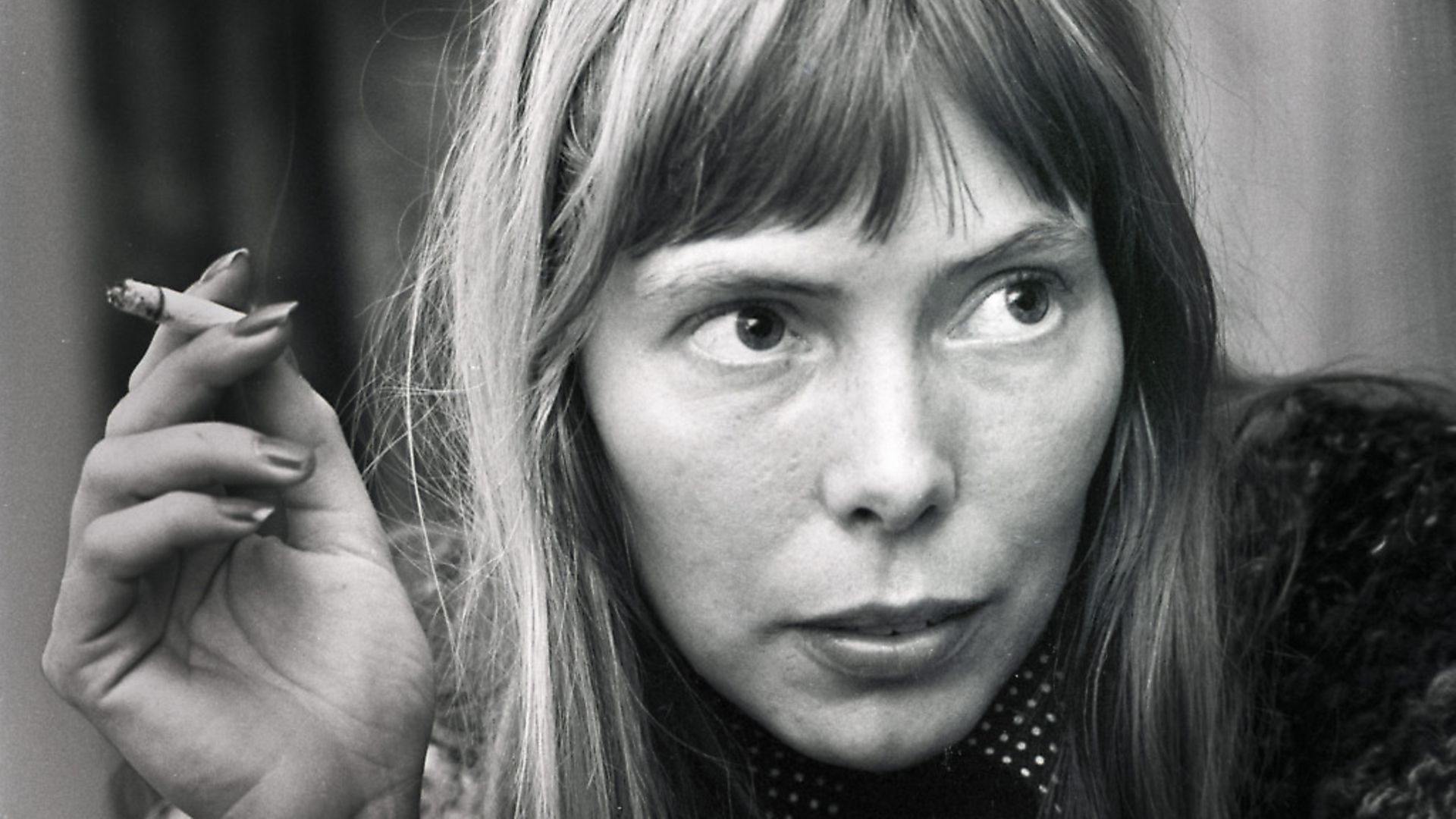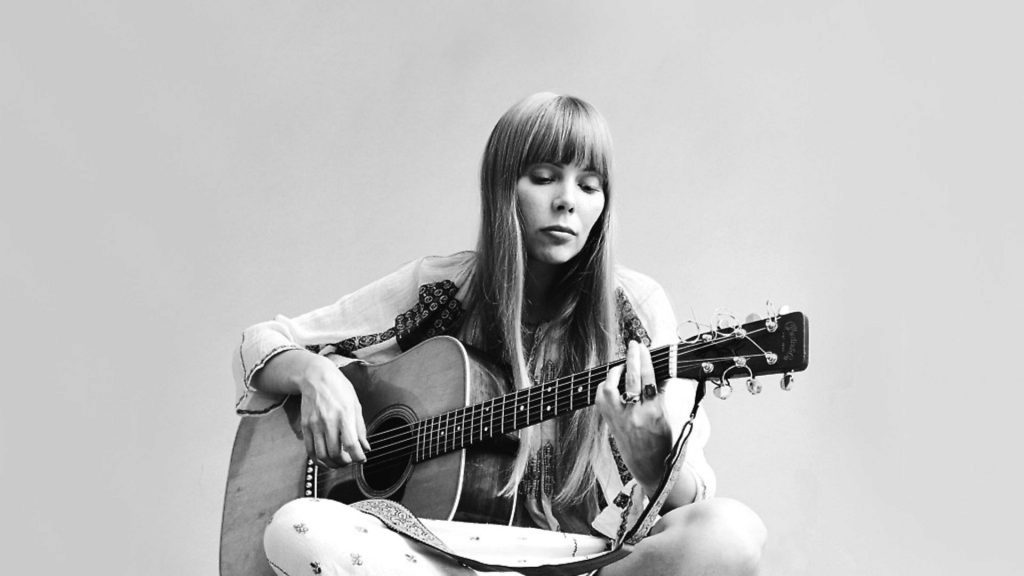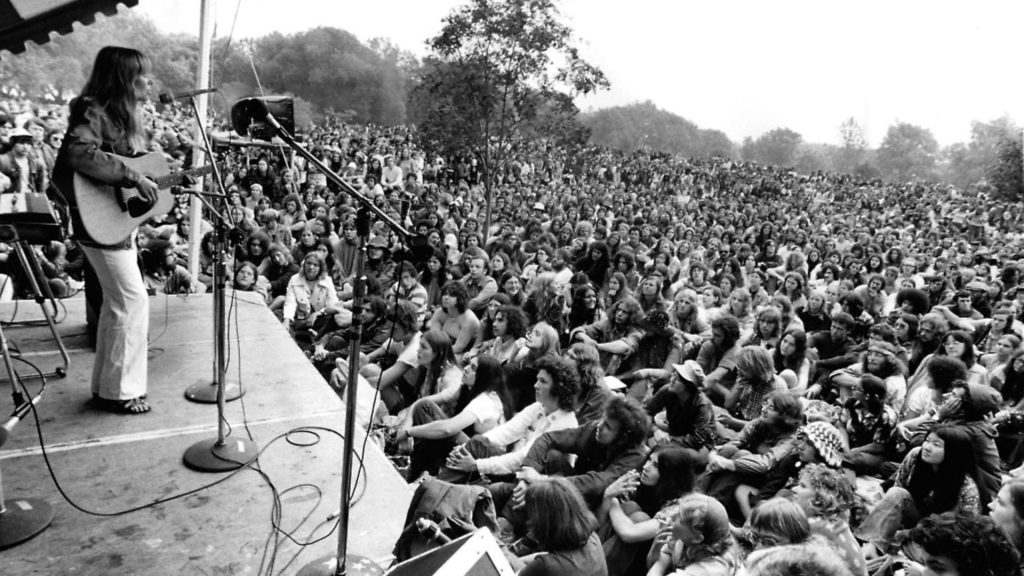
Despite the repeated attempts of fans and critics, Joni Mitchell has always thwarted efforts to pigeonhole her.

Adam Behr on the remarkable career of a universally-acclaimed free spirit.
The film of a tribute concert to Joni Mitchell currently doing the rounds of UK cinemas, alongside news of the release this autumn of a book of her drawings, paintings and poems, are a variation on the standard valedictory ‘greatest hits’ tour.
Partly, of course, this is down to ill-health, notably a brain aneurysm in 2015 which, notwithstanding a few public appearances and an ongoing process of recovery, has curtailed her activities.
The concert film – featuring a host of luminaries like David Crosby and James Taylor performing at an LA event last autumn to celebrate Mitchell’s 75th birthday – is somehow an apt chance to pay tribute, both despite – and because of – her increasing reclusiveness.

As a celebration with the main protagonist strangely absent, there’s a reflective component to it, but also an attempt to capture a moment in the present (or at least recent past) that chimes with the paradoxical nature of her persona; she has long straddled pop’s fault-lines as a hugely influential figure, lauded for cathartic, emotionally intimate songwriting that universalised her experiences, while maintaining an intensely private demeanour. Her attitude to the fame, as opposed to the work – the art – that’s associated with popular music has also been ambivalent.
Few musicians, even in the comfort of widespread, late-career acclaim, would get away with calling Bob Dylan a ‘plagiarist’, and Madonna a turning point in the degradation of culture: ‘Americans have decided to be stupid and shallow since 1980. Madonna is like Nero; she marks the turning point.’
But then Joni Mitchell has rarely operated like other musicians or pandered to the popular musical canon, even though she’s a part of it.
Indeed, a polymath and successful visual artist as well – she was responsible for many of her album covers – her own perceptions of her work sit askance of her public status. She has described herself as ‘a painter derailed by circumstance’. There has always been a contradictory strand running through her career.
Recipient of a string of Grammy and other awards – including election to the Rock and Roll Hall of Fame, the ASCAP Founders Award and Billboard’s Century Award – she is garlanded within, yet sometimes misread by, popular culture at large.
The confessional style on hit albums such as Blue and Court and Spark have led to an easy, perhaps even lazy, portrait of her as a template for a particular type of female singer-songwriter.
An emphasis on her lyrics and voice, though, can overlook her compositional range, analysis of which has revealed an experimental component and level of harmonic complexity that, as musicologist professor Lloyd Whitesell put it, works beyond ‘traditional tonal syntax’ while retaining its capacity for engaging listeners.
She is also a more unique and sophisticated guitar player than is sometimes credited beyond her fan base and, to be fair, other guitarists. Typically for her sideways, self-taught approach, and indicative of her innovation in the face of obstacles, this partly derives from a childhood bout of polio that weakened her left hand.
To work around the limitations this imposed, she developed a palette of multiple, often obscure, alternative tunings that imbue her playing with its distinctive modal and chromatic qualities. Likewise, she has often composed on piano before recording on guitar.
Thus, her early association with acoustic guitar to underpin her songs is at odds with the traditional (male) portrait of the guitar hero and potentially misleading in terms of her genre orientation, bending towards a focus on folk that risks glossing over her cross-genre work.
Much of her mien and grit in terms of her self-presentation have resonated with the rock world, and her stylistic fluidity and musical restlessness were never in hock to a particular tradition. ‘Fusion’ is often thought of as characterised by searing, improvisatory solos, or jazz-funk with rock instrumentation. Yet Mitchell’s work in the 1970s is arguably a genuine, literal ‘fusion’ of rock, folk and jazz.
Albums like Hejira saw her working successfully with the cream of the jazz world, evolving into a collaboration with legendary, and legendarily fractious, bassist-composer Charles Mingus that also featured the likes of Herbie Hancock, Wayne Shorter and Jaco Pastorius.
It’s never been easy being a Joni Mitchell fan though. Many found her tilt towards jazz difficult and the Mingus album, in particular, confounded expectations and was a comparative commercial and critical disappointment compared to what had come before.
She seems unperturbed by this, and unwilling to play up to stereotypes. The tension here is partly derived from industry and media sexism (conscious or otherwise) and a consequent tendency to trammel her into a delicate corner as a willowy songstress.
A Time magazine portrait of 1974 described her as, ‘the rural neophyte waiting in a subway, a free spirit drinking Greek wine in the moonlight, an organic Earth Mother dispensing fresh bread and herb tea’.
But this belies the steely, trenchantly observational facets to her songs, and personality. Mitchell was no-one’s wallflower. Nor, though, was she anyone’s feminist, except perhaps her own – and in action as opposed to rhetoric.
She has always disavowed the label. Here, still, this is less about accepting the strictures of the industry, or broader social constraints, and more about her wariness of being under anyone else’s umbrella.
As she put it, ‘I’d rather go toe to toe with a guy than have a posse… I thought people should fight for their rights individually – not in a group.’
The same applies to attempts to align her with the Baby Boomer, counter-culture of the 1960s. She wrote Woodstock (covered by the likes of Crosby, Stills, Nash and Young), but wasn’t at the festival, and stated that she was ‘not a part of anti-war movement… I played in Fort Bragg… I went the Bob Hope route, you know, because I had uncles that died in the war, and I thought it was a shame to blame the boys that were drafted’.
It’s not that she was averse to protest – Big Yellow Taxi, for instance, highlighted the ecological risks of modern life before that was a mainstream concern, and she directed her barbs against televangelists in the 1980s. Rather, she ploughed her own furrow.
Whatever level of activity she pursues from here, it was always unlikely that she would relax into the comfortable heritage-rock tour circuit or bask contentedly in the warmth of admiration for her back catalogue.
She embodies the contradictions of the ‘mainstream’ in popular music, which has always incorporated outside elements even as it appeals to a wide audience. For Mitchell, her widespread influence has always belied the fact that her defining characteristic has been a steadfast – obdurate, even – individuality. A hard road, perhaps, but hers. Or, in her words, ‘You’re on your own, let’s face it. And that’s OK’.
Joni 75: A Birthday Celebration is in cinemas now
• For more arts and culture from The New European pick up a copy of our weekly newspaper – or subscribe for just £13









